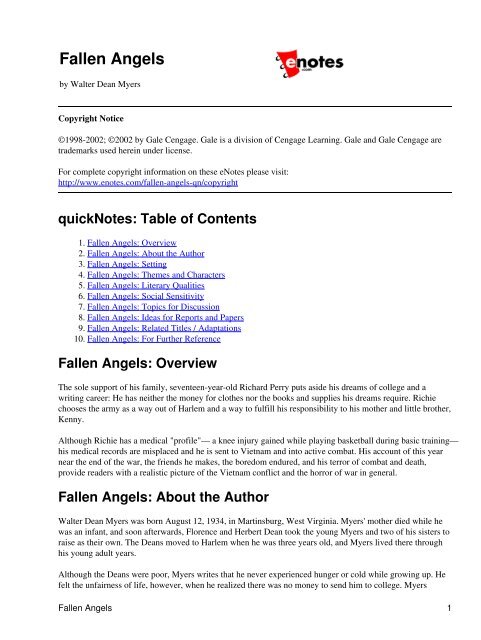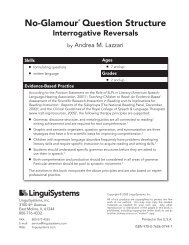Fallen Angels - Millbury Public Schools Community Portal
Fallen Angels - Millbury Public Schools Community Portal
Fallen Angels - Millbury Public Schools Community Portal
Create successful ePaper yourself
Turn your PDF publications into a flip-book with our unique Google optimized e-Paper software.
<strong>Fallen</strong> <strong>Angels</strong><br />
by Walter Dean Myers<br />
Copyright Notice<br />
©1998-2002; ©2002 by Gale Cengage. Gale is a division of Cengage Learning. Gale and Gale Cengage are<br />
trademarks used herein under license.<br />
For complete copyright information on these eNotes please visit:<br />
http://www.enotes.com/fallen-angels-qn/copyright<br />
quickNotes: Table of Contents<br />
1. <strong>Fallen</strong> <strong>Angels</strong>: Overview<br />
2. <strong>Fallen</strong> <strong>Angels</strong>: About the Author<br />
3. <strong>Fallen</strong> <strong>Angels</strong>: Setting<br />
4. <strong>Fallen</strong> <strong>Angels</strong>: Themes and Characters<br />
5. <strong>Fallen</strong> <strong>Angels</strong>: Literary Qualities<br />
6. <strong>Fallen</strong> <strong>Angels</strong>: Social Sensitivity<br />
7. <strong>Fallen</strong> <strong>Angels</strong>: Topics for Discussion<br />
8. <strong>Fallen</strong> <strong>Angels</strong>: Ideas for Reports and Papers<br />
9. <strong>Fallen</strong> <strong>Angels</strong>: Related Titles / Adaptations<br />
10. <strong>Fallen</strong> <strong>Angels</strong>: For Further Reference<br />
<strong>Fallen</strong> <strong>Angels</strong>: Overview<br />
The sole support of his family, seventeen-year-old Richard Perry puts aside his dreams of college and a<br />
writing career: He has neither the money for clothes nor the books and supplies his dreams require. Richie<br />
chooses the army as a way out of Harlem and a way to fulfill his responsibility to his mother and little brother,<br />
Kenny.<br />
Although Richie has a medical "profile"— a knee injury gained while playing basketball during basic training—<br />
his medical records are misplaced and he is sent to Vietnam and into active combat. His account of this year<br />
near the end of the war, the friends he makes, the boredom endured, and his terror of combat and death,<br />
provide readers with a realistic picture of the Vietnam conflict and the horror of war in general.<br />
<strong>Fallen</strong> <strong>Angels</strong>: About the Author<br />
Walter Dean Myers was born August 12, 1934, in Martinsburg, West Virginia. Myers' mother died while he<br />
was an infant, and soon afterwards, Florence and Herbert Dean took the young Myers and two of his sisters to<br />
raise as their own. The Deans moved to Harlem when he was three years old, and Myers lived there through<br />
his young adult years.<br />
Although the Deans were poor, Myers writes that he never experienced hunger or cold while growing up. He<br />
felt the unfairness of life, however, when he realized there was no money to send him to college. Myers<br />
<strong>Fallen</strong> <strong>Angels</strong> 1
dropped out of high school, but continued the high volume of reading and writing he had begun in grade<br />
school. He drifted for a few years and then, at seventeen, joined the army. Once out of the army, Myers<br />
married, started a family, and worked at various jobs in New York City. While his strong desire to write led to<br />
publications in magazines, finding an audience and market for the kind of writing he hoped to do remained a<br />
challenge.<br />
After a divorce, Myers became a senior editor for the Bobbs-Merrill Publishing Company where he learned<br />
the business of writing first-hand. During this time he published his first picture book for children, Where<br />
Does the Day Go?? (1969), winning a contest sponsored by the Council on Interracial Books for Children.<br />
More picture books followed—The Dancers (1972) and The Dragon Takes a Wife (1972). When he published<br />
his third picture book Fly, Jimmy, Fly! (1974), Myers changed his given name—Walter Milton Myers—to<br />
Walter Dean Myers in honor of the parents who raised him. He continued to write for a variety of magazines,<br />
and he also published his first young adult novel, Fast Sam, Cool Clyde, and Stuff (1975).<br />
Since then he has written several highly acclaimed books for young adults. The Young Landlords (1979), The<br />
Legend of Tarik (1981), and The Mouse Rap (1990) were named American Library Association Best Books<br />
for Young Adults. The Young Landlords and Motown and Didi (1984) both received the Coretta Scott King<br />
Award. Scorpions (1988), his book depicting the hard and sometimes tragic choices young people have to<br />
make regarding gangs, guns, and drugs was a 1989 Newbery Honor Book. Myers's latest works include a<br />
biography, Malcolm X: By Any Means Necessary (1993), and a beautiful book of poems written to accompany<br />
photographs of African-American children living at the turn of the century, Brown <strong>Angels</strong>: An Album of<br />
Pictures and Verse.<br />
Myers remarried and now lives with his family in Jersey City, New Jersey. In the course of his career, he also<br />
attended the State College of the City of New York and received a B.A. from Empire State College. He has<br />
taught classes in college and workshop settings, sharing his knowledge and experience with writers of all<br />
ages.<br />
Myers has found both an audience and market with his young adult novels. In addition, he has discovered<br />
important aspects of his role as a writer: to show the value of young African Americans' lives and to fill a<br />
longstanding literary void with serious and constructive images of African Americans in life, work, and<br />
relationships with others. "It's my job as a writer," he recently stated, "to include people— to bring people into<br />
society."<br />
<strong>Fallen</strong> <strong>Angels</strong>: Setting<br />
Upon his arrival in the country, Richie is sent to the American base at Chu Lai in South Vietnam. He spends<br />
the greater part of his tour of duty on patrols and pacification missions in the villages nearby. Richie describes<br />
the monotony and tediousness of army life—long days punctuated by predictably bland meals, mail call, and<br />
the brief but terrifying forays into the countryside where violence and death occur with astonishing and<br />
numbing consistency. The physical danger Richie and his comrades face is framed within the ever-present<br />
threat of death and the black body bags awaiting those "warrior angels who fall."<br />
Richie's one respite from duty is at a hospital where he recovers from minor shrapnel wounds and is awarded<br />
a purple heart. Given orders to rejoin his unit, Richie arrives in time for the Tet Offensive. He earns yet<br />
another purple heart before being sent back to "the World"—the soldiers' term for America and the lives that<br />
await them should they survive.<br />
<strong>Fallen</strong> <strong>Angels</strong>: About the Author 2
<strong>Fallen</strong> <strong>Angels</strong>: Themes and Characters<br />
Coming of age, finding one's place in the world, and survival of self-against society are the themes in <strong>Fallen</strong><br />
<strong>Angels</strong>. Richie arrives in Vietnam "ready to stop the North Vietnamese from taking over South Vietnam. I<br />
didn't feel really gung ho or anything, but I was ready to do my part." As Richie faces the reality of war, he<br />
questions whether the loss of lives and emotional wellbeing is ever worth the so-called benefit of winning.<br />
Richie discovers that there are no winners in war—just survivors. Each individual must redefine the person he<br />
thought he was and reconcile this unfamiliar persona with the man he will become should he live.<br />
Richie is an observer. Through his straightforward narrative, readers meet the other characters and experience<br />
total immersion in the war-time setting of Vietnam. Recounting his first combat mission, Richie describes the<br />
men who, for different reasons, become an important part of his life in Vietnam:<br />
I looked over at Johnson. The one expression he had in the world was on his face. Peewee<br />
was busy looking out the door. Jenkins had his eyes closed and his knuckles were white from<br />
holding onto the seat.<br />
Jenkins, so scared that he can hardly function, steps on a mine and dies on this first mission. This is Richie's<br />
first experience with death at close range. Richie is disturbed that he is the only one who seems to remember<br />
that Jenkins ever existed. More deaths soon follow, and Richie learns that there is no time to mourn. When he<br />
kills his first Viet Cong in a face-to-face confrontation, Richie crosses over the line from youth to adulthood.<br />
The issue is survival: There is no room for patriotic ideals or sentimentality.<br />
As Richie's understanding of the war and his role in it deepen, so do his insights into the men he lives and<br />
fights with. Johnson, a large black man from Savannah, Georgia, joined the army because there was nothing<br />
for him to do in the World. At first he appears to Richie to have one expression on his face—"his mouth sort of<br />
hung open"— no matter what. As Johnson deals with the racist Sergeant Dongan, however, Richie realizes that<br />
different forces have shaped Johnson. "There was a knowing about him, as if dying and fighting was<br />
something he had been born to."<br />
Peewee Gates, a high school dropout from Chicago provides much of the comic relief in the novel. His<br />
reasons for joining the army suggest a background of profound poverty and the kind of life he left behind in<br />
the World. "This is the first place I ever been in my life where I got what everybody else got," meaning the<br />
very basic necessities of life—food, clothing, and shelter. Peewee approaches Vietnam like it is an extension of<br />
the Chicago projects where he grew up. Full of bravado, he stares down bigger men, daring them to cross his<br />
boundaries. He already knows why he and the other men fight and kill the enemy—"cause he [the Viet Cong]<br />
was gonna kill your ass if you didn't kill his"—he explains to Richie. Yet, like Richie, he wants to survive.<br />
When Captain Stewart chastises Peewee and asks him where his pride is, he responds that he left it in Chicago<br />
and says, "Can I go get it?"<br />
A revolving cast of characters enter and leave in accordance with both the army's and death's time-lines:<br />
Simpson, the black sergeant who is close to getting out and tells the new arrivals that his main goal is to keep<br />
them from killing him; Lieutenant Carroll, a sensitive white officer who puts his life on the line for one of his<br />
"warrior angels," thus winning the men's respect and affection; Lieutenant Gearhart, Carroll's replacement,<br />
who forms an uneasy alliance with the men after a failed first mission; and Captain Stewart, who panders to<br />
the media and strives for promotion at the expense of his soldiers' safety and lives. These characters represent<br />
familiar types and serve to facilitate the development of plot and action. They also represent the transitory<br />
nature of human relationships during war.<br />
<strong>Fallen</strong> <strong>Angels</strong>: Themes and Characters 3
Other characters are more fully developed and play larger roles in Richie's account: Lobel, who joins the army<br />
to prove his manhood, only to find himself the target of other soldiers' homophobia and anti-Semitism; and<br />
Monaco, who identifies most strongly with Richie, Johnson, Peewee, and Lobel, and also bears the brunt of<br />
discrimination that men like Sergeant Dongan and Brunner, one of their own squad members, perpetuate.<br />
Newcomers enter into the stream of activity and the war; however, Richie and his comrades have closed<br />
ranks. Their individual goals are also the collective goal—to survive and put together some kind of worthwhile<br />
life once they are home.<br />
<strong>Fallen</strong> <strong>Angels</strong>: Literary Qualities<br />
The first-person narrative brings an immediacy to the action and descriptions in the novel. Through Richie's<br />
observations and commentary, readers see the interplay between the soldiers and officers on the squad. They<br />
also learn about the army hierarchy, the routines, the weapons, and the chemical arsenal specific to the<br />
Vietnam war.<br />
The soldiers' talk, often raw and coarse, reveals the elemental function language plays in keeping fear at bay<br />
and maintaining the toughness combat requires. This "linguistic setting," the language of the army and the<br />
very basic language of survival, is convincing, realistic, and appropriate to the context and the direct tone of<br />
the novel.<br />
The emphasis on the dailiness of the men's lives and the effect communication from the World has on their<br />
emotional well-being is realistic and sensitive to the characters' identities. Conversations about family,<br />
girlfriends, and their lives back home, show how much or little these young men have to look forward to on<br />
their return. As the novel progresses, the dialogue shows how the war experience changes their views of the<br />
world and themselves.<br />
<strong>Fallen</strong> <strong>Angels</strong>: Social Sensitivity<br />
Myers's novel deals with social issues of current importance and concern in society: the morality of war,<br />
racism, and classism. The most pertinent is war and whether it is ever justified. Richie tries to rationalize his<br />
and the other men's presence in Vietnam. Ultimately, he concludes that as much as fighting for the good of the<br />
South Vietnamese and the suppression of Communism, he is fighting for his own survival. To his dismay, he<br />
is also put in the position of fighting for the greed and glory of certain commanding officers. Richie watches<br />
Captain Stewart inflate the enemy body count and downplay American casualties in order to achieve a<br />
promotion to major. Over time, this practice depletes the numbers of men in the squad and the company.<br />
When the Tet Offensive is launched, only a few of Richie's original squad remain.<br />
Subtle and pervasive elements of racism and classism are revealed through rank in the army hierarchy. A new<br />
sergeant places the black soldiers on point—the most dangerous position— when they go out on patrol.<br />
Johnson, who carries the bigger M-60 machine gun, is ordered to the vulnerable rear position. That the men<br />
on the squad close ranks, rotate the point positions, and watch out for Johnson, is a testimony to the loyalty<br />
and protectiveness they feel toward one another. With the exception of Brunner, the soldiers realize that in<br />
battle there is no room for race and class distinctions. The survival of one individual heightens others' chances<br />
for survival.<br />
Still, there is acknowledgement and awareness of class differences as the men share letters and imagine the<br />
lives they will return to. For Peewee and Johnson, uneducated and untrained for anything except war, the<br />
choices are limited. Lobel sees the war as a movie, a perspective generated from growing up with an artistic<br />
film-director father. This view distances him from the realization that rebelling against his father and enlisting<br />
<strong>Fallen</strong> <strong>Angels</strong>: Literary Qualities 4
in the army has backfired. What he cannot picture, however, is the reality of a world that denounces his<br />
involvement in the war and the actions he has taken to remain alive.<br />
Captain Stewart continues to volunteer his company for combat missions. While Lieutenant Gearhart stands<br />
up for his squad, his letters home advising his wife on what kinds of doors to purchase for the house and how<br />
to handle a recalcitrant paper boy, highlight major distinctions between the officers and enlisted men and<br />
show how different their worlds are.<br />
Richie, aware of the cost of his decision to join the army rather than persist in his dream to attend college,<br />
hopes that people back in the World will not expect him to be the same when he returns. He understands the<br />
high cost of his and the other young men's passage to adulthood. Richie's description of Lobel during battle<br />
illustrates just how high it is:<br />
When I saw him I froze. His eyes were open but there was no expression in them.<br />
"Lobel!" I called to him.<br />
"Wha?"<br />
"You okay?"<br />
"Yeah."<br />
"Shit, I thought you were dead."<br />
He smiled. His face was caked with dirt, and the smile showed his teeth. The blank<br />
expression in his eyes never changed.<br />
This war experience has shown these young men death and trained them to kill. In order to survive, they have<br />
killed a part of themselves. Richie does return to the World, but it will be a long time before that part of him<br />
comes alive again.<br />
<strong>Fallen</strong> <strong>Angels</strong>: Topics for Discussion<br />
1. Richie has dreams of going to college and becoming a writer, yet, he forgoes these to join the army. Why<br />
does he feel this is his only option?<br />
2. Richie's medical profile gives him a valid reason for not engaging in combat. Once on the base at Chu Lai,<br />
why does he not use it to obtain less dangerous duty?<br />
3. The young men of Alpha Company look up to their platoon leader, Lieutenant Carroll. Why? How has he<br />
earned their respect and trust?<br />
4. Lieutenant Carroll no longer seems sure of his faith, yet, he continues to pray for his men who he calls<br />
"warrior angels." Why?<br />
5. The warrior angels are too young to vote. Is it fair to expect them to fight in the war?<br />
6. Why are Richie, Peewee, Jenkins, Johnson, and Lobel in Vietnam? What reason does each of them give<br />
when asked? What role does race, class, education, opportunity, and parental involvement play in the young<br />
men's explanations?<br />
7. What changes does Richie undergo during the course of his year in Vietnam. How will these changes affect<br />
him once he is back in the World?<br />
8. What kind of life awaits Peewee on his return to the World? Will it be the same or different from Richie's<br />
life? Why?<br />
<strong>Fallen</strong> <strong>Angels</strong>: Social Sensitivity 5
9. The letters that Richie, Lieutenant Carroll, and others write home rarely reflect the reality of Vietnam. Why<br />
is it so difficult for Richie to write home? Why does his mother send her message of love through a letter to<br />
Peewee? (Chapter 11)<br />
10. Captain Stewart asks Richie to rewrite Lieutenant Gearhart's letter telling Turner's family of his death.<br />
Why? (Chapter 14)<br />
11. Captain Stewart routinely inflates the numbers of enemy killed. Why? How does this affect the men in the<br />
squad? How does it affect the people following the war at home?<br />
12. Why was Richie, rather than Peewee Gates, or Monaco, chosen to narrate this story? How would it be<br />
different if told by Peewee or Monaco?<br />
<strong>Fallen</strong> <strong>Angels</strong>: Ideas for Reports and Papers<br />
1. Myers has created a world and populated it with characters from a variety of places and backgrounds. Even<br />
though this world is different from yours, how does Myers make the story probable or possible?<br />
2. Myers has created a seemingly realistic picture of the last years of the Vietnam War. Find an article, news<br />
account, or essay about the war. Compare this account with an incident or description from the novel. Does<br />
Myers's portrayal stand up to the comparison?<br />
3. In her review of <strong>Fallen</strong> <strong>Angels</strong>, Ethel L. Heins states that "the dialogue . . . is steeped in natural vulgarity. . .<br />
," and that this aspect of the novel contributes to the authenticity and credibility of the plot and the characters.<br />
Do you agree? Why or why not?<br />
4. In Chapter 15, Richie tries to write a letter to his little brother, Kenny. He wants to tell him about the war<br />
and killing a Viet Cong, but finds that he cannot put the experience into words. How does he explain what the<br />
war means and his reason for being there in a non-glorifying and honest way?<br />
<strong>Fallen</strong> <strong>Angels</strong>: Related Titles / Adaptations<br />
Myers's fiction focuses on the experiences of young African Americans in society. His characters live in large<br />
cities where many of the choices they make concern basic family and economic survival. Some readers will<br />
find their experiences accurately represented in his books. Others may see a world much different than their<br />
own, and still relate to the common problems surrounding adolescence and young adulthood.<br />
Myers's books, such as It Ain't All for Nothin' (1978) and Scorpions (1988) deal with the harsh realities of life<br />
in the inner city. Myers also details strong and loving ties between the family members and friends that<br />
populate his books. In turn, his characters "reflect pride in their individuality and in their decisions to be<br />
themselves." The cost of making hard choices, facing up to reality, and doing the right thing given a particular<br />
time and circumstance, are problems Richie faces in <strong>Fallen</strong> <strong>Angels</strong>. These same issues emerge in Scorpions.<br />
In this Newbery Honor Book, young Jamal reluctantly becomes involved in gang activity. His fascination<br />
with a gun—a symbol of power and identity in a world where he often feels weak and small—reveals a side of<br />
himself he is not sure how to handle. He knows the gun only brings trouble, yet he cannot bring himself to<br />
give it up. This inner conflict is played out in Jamal's attempts to make sense of the world and the choices it<br />
presents him. Like Richie, Jamal discovers that growing up and finding his place in the world is a difficult and<br />
ambiguous process.<br />
<strong>Fallen</strong> <strong>Angels</strong>: Topics for Discussion 6
Readers can gain a deeper understanding of the African-American experience through Myers's nonfiction<br />
work, Now is Your Time! The African-American Struggle for Freedom (1991). Myers wrote this history to<br />
provide readers with a way to identify with historical figures as well as with his fictional characters. Written<br />
from a black perspective, the text recounts the African-American fight for freedom and civil rights in the<br />
United States. Myers researched archives, conducted interviews, and recorded oral histories of people whose<br />
families he declares "are so vital a part of American history." In his introduction Myers writes that:<br />
The African-American experience . . . is a living experience, ever changing, ever growing,<br />
ever becoming richer. Events of the past cannot change, but they can change in our perception<br />
of them, and in our understanding of what they mean to us today. What we understand of our<br />
history is what we understand of ourselves.<br />
These words best represent the contributions Myers has made to young adult literature. His substantial and<br />
respected body of writing reflects a clear and informed understanding of both the past and present. Myers<br />
indeed shows the value of young African-American lives. In the process, readers come to know and better<br />
understand their own and others' experiences.<br />
<strong>Fallen</strong> <strong>Angels</strong>: For Further Reference<br />
"Celebrating Literacy: The Language of Freedom." Reading Today 9 (1992): 1. This article provides an<br />
account of Myers's talk to the general assembly at the 1992 International Reading Association Conference.<br />
Heins, Ethel L. Review. Horn Book 64 (July/August 1988): 503-504. Heins acknowledges the "dearth" of<br />
literature about Vietnam for young adults, and notes that "Fortunately, [Myers] is a writer of skill, maturity,<br />
and judgement." Heins compares this novel to Stephen Crane's The Red Badge of Courage in its depiction of<br />
"the chaos and carnage of war."<br />
Norton, Donna E., ed. Through the Eyes of a Child: An Introduction to Children's Literature. New York:<br />
Merrill (Macmillan), 1991. This reference text provides descriptions of Myers's novels and picture books. The<br />
works are discussed within both genre and elements of literature frameworks.<br />
Review. English Journal 77 (December 1988): 70. This brief review ranks <strong>Fallen</strong> <strong>Angels</strong> with other quality<br />
literature about Vietnam such as Tim O'Brien's Going after Cacciato. The advantage of Myers's text,<br />
according to this reviewer, is "its accessibility to junior and senior-high school students."<br />
Salvadore, Maria B. Review. School Library Journal 35 (June/July 1988): 118. Salvadore highlights the<br />
attention to detail and authenticity that characterizes Myers's novel of war and recommends it for both young<br />
adults and adults. She notes that "other difficult issues—such as race and the condition of the Vietnamese<br />
people, are sensitively and realistically" portrayed.<br />
Sutherland, Zena. Review. Bulletin from the Center of Children's Books 41 (April 1988): 163. This brief<br />
review describes Myers's novel as "an indictment of all war . . . . A tough book, a vivid story."<br />
Watkins, Mel. Review. New York Times Book Review (January 22, 1989): 29. Watkins's review emphasizes<br />
the strong and original characters that Myers has created in this novel. He gives this novel high marks for<br />
being "a candid young adult novel that engages the Vietnam experience squarely . . . . It is a tale that is as<br />
thought-provoking as it is entertaining, touching, and, on occasion, humorous."<br />
<strong>Fallen</strong> <strong>Angels</strong>: Related Titles / Adaptations 7






